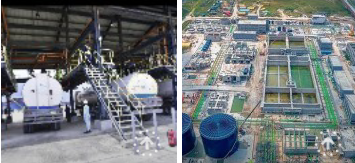—- Says Dangote Refinery Import 9 – 10 million barrels of crude monthly from US, others.
Africa is increasingly becoming a destination for cheap, often toxic petroleum products – many of which are blended to substandard levels that would not be permitted in Europe or North America.
This concern was raised by the President/ Chief Executive, Dangote Industries Limited, Aliko Dangote, during the ongoing West African Refined Fuel Conference in Abuja.
The event organised by the Nigerian Midstream Petroleum Regulatory Authority ( NMDPRA) and S & P Global Commodity Insights.
Dangote revealed that due to the continent’s limited domestic refining capacity. Africa import over 12 million tonnes of refined petroleum products annually, ate a cost of approximately $90 billion.
While appreciating the Management of the NNPCL, for marking some cargoes of Nigerian Crude available to us from of production to date, he revealed that the company import between 9-10 million barrels of crude from USA and other Countries.
He said: “As we speak today, we buy 9 – 10 barrels of crude monthly from US and other countries. I must thank NNPC for making some cargoes of Nigerian Crude available to us from start of production to date.
Dangote further stated that despite producing around 7 million barrels of crude oil per day, Africa only refines about 40% of 4.3 million barrels daily consumption in stark contrast, Europe and Asia refined over 95% of what they consume.
“So while we produce plants of crude, we still import over 120 million tonnes of refined petroleum products each year, effectively exporting jobs and importing poverty into our continent. That’s $90 billion market opportunity being captured by regions with surplus refining capacity.
To put this in perspective only about 15% of African Countries have a GDP greater than $90 billion. We are effectively handing over an entire continent’s economic potential to others year after year, he said.
Africa’s wealthiest man described building refineries such as the Dangote Petroleum Refinery as one of the most capital – intensive and logistics complex Industrial facilities ever constructed. The Dangote refinery project, he said, required clearing 2, 735 hectares of land ( seven times the size of Victoria Island), of which 70% was swampy, requiring the pumping of 65 million cubic metres of sand to stabilise the site and raise it by 1.5 metres, over 250, 000 foundation piles, and millions of metres of piping, cabling and electrical wiring among others.
“At peak, we had over 67,000 people on – site of which 50,000 are Nigerians, coordinating around the clock across hundreds of discipline and nationalities. Then of course came the COVID – 19 pandemic which set us back by two years and brought new levels of complexity, disruption, and risk. But we persevered,” he noted.
The refinery also requires the construction of dedicated seaport, as existing Nigerian Ports could not the size and volume of equipments, 330 cranes, and even the establishment of world’s largest granite quarry with a production capacity of 70 million tonnes per year. “In short, we didn’t just build a refinery – we built an entire ecosystem from the scratch,” he said.
Despite the refinery’s technical success, Dangote Identified Significant Commercial Challenges, particularly exchange rate, which has gone from N156/$ at inception to N1,600/$ at completion, and challenges around crude oil sources.
Although Nigeria is said to produce about 2 million barrels per day, the refinery has struggled to secure crude at competitive terms. “Rather than buying crude oil directly from Nigerian Producers at competitive terms, we found ourselves having to negotiate International trading companies, who are buying Nigerian Crude and reselling it to US – with hefty premiums of course.
Logistics and regulatory bottlenecks have also taken a toll. Port and regulatory charges reportedly account for 40% of total freight costs, sometimes two – thirds as much as chartering the vessel itself.
“Refiners in India, who purchase, crude oil from regions ever farther away, enjoy lower freight costs, than we do right here in West Africa. Because they are not saddled with exorbitant port charge, Dangote said.
Dangote further criticised the lack of harmonised fuel standards across African nations; which create official barriers for regional trade in refined products.























